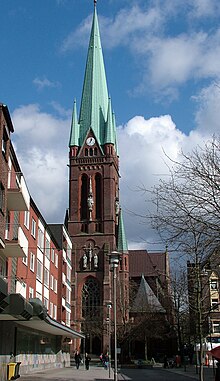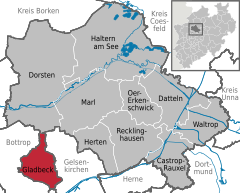|
Gladbeck
Gladbeck (German pronunciation: [ˈɡlat.bɛk] ⓘ) is a town in the district of Recklinghausen in North Rhine-Westphalia, Germany. Gladbeck is quite a young town, first recognised 21 July 1919 when it was given town rights. The town established itself around five farming villages, Brauck, Butendorf, Ellinghorst, Rentfort and Zweckel. GeographyGladbeck is located in the northern part of the Ruhr Area and belongs to the so-called Emscherzone in which mining started late in relation to other towns of this area. Gladbeck is predominantly surrounded by Bottrop, Gelsenkirchen, Dorsten and by Essen in the south. HistoryPre-industrial societyEarly archeological finds prove that the region of Gladbeck was already populated as early as 2000 BC. It was first mentioned in 1020 as Gladbeki and was originally a small village of 300 inhabitants. The village with its five peasantries (Butendorf, Brauck, Rentfort, Ellinghorst and Zweckel, now quarters of Gladbeck) was arranged around St. Lamberti cathedral. From 1180 to 1802 Gladbeck belonged to the Vest Recklinghausen and was thus linked with the Electorate of Cologne. A certificate from 1236 mentions Knight Ludolfus de Wittering who is most likely to have erected Wittringen Castle around that time. Especially during the first years of the Thirty Years' War (1618–48) many cornfields in and around Gladbeck were destroyed by marauding soldiers. Additionally, the Black Death killed many inhabitants of Gladbeck during the Thirty Years' War. At the 1815 Congress of Vienna the Kingdom of Prussia acquired the area and administered it within the Province of Westphalia. Before the Revolutions of 1848 there were three bad food crises in Gladbeck in 1816/17, 1830/31 and 1846/47. However, the "March Revolution" had no consequences on Gladbeck. Time of coal mining Coal was found in the 1870s and the first coal was produced in 1878. Depending on additional workers, the coal mines attracted many people. Therefore, Gladbeck rapidly grew by immigration from surrounding Westphalia, the Rhine Province, and from the eastern provinces of Prussia including citizens with Polish as their native language. The little village quickly turned into an establishment of industry and was given town privilege in July 1919. Also Gladbeck benefited from the general boom in the years 1925 to 1929 when important building projects were realised in spite of all troubles, such as the open-air bath as well as the stadium, in which Adolf Hitler delivered a speech in 1932.  As with all German towns, Gladbeck was brought into line after Adolf Hitler was named Reichskanzler. This took place under the earlier elected conservative mayor Bernhard Hackenberg, immediately joining the Nazi Party. In World War II Gladbeck was heavily damaged and around 43% of the buildings in the center were destroyed, making it as one of the most destroyed towns in the Ruhr Area. After the war the town became part of the new state of North Rhine-Westphalia. During the 1960s the coal industry went into a substantial crisis, resulting in widespread unemployment. Apart from this Gladbeck's population reached 85,927 inhabitants in 1969, which is unique in the history of this town. Since the last coal mine was closed in 1971 Gladbeck is fighting against a high rate of unemployment, activating the structural change. Communal realignment and history since 1975In the course of the communal realignment in North Rhine-Westphalia (1975) Gladbeck, original a county borough, and the village Kirchhellen were incorporated into the neighbouring town Bottrop. Opponents of the realignment criticized the low population density at the border between Gladbeck and Bottrop and emphasized that Bottrop was not much bigger than Gladbeck. "GlaBotKi is nich" (Glabotki is not) was their catchphrase. With the help of a court decision Gladbeck successfully left Bottrop, thereby cancelling the merger. Since July 1976 Gladbeck is part of the district of Recklinghausen. On 16 August 1988, the town received international attention when two thieves robbed a branch of the Deutsche Bank in Gladbeck. They kidnapped two bank employees and held them hostage, along with 32 people in a transport bus in Bremen and drove through West Germany and the Netherlands. In what was called the Gladbeck hostage crisis, the crisis ended in just over 2 days, with one police officer and two victims dead, and the arrest of the three individuals (Hans-Jürgen Rösner & Dieter Degowski, along with Marion Löblich for her involvement in the crime as an accomplice). PoliticsThe current mayor of Gladbeck is Bettina Weist of the Social Democratic Party (SPD) since 2020. The most recent mayoral election was held on 13 September 2020, with a runoff held on 27 September, and the results were as follows:
List of mayors Gladbeck possesses a mayor since it gained town privilege in July 1919. Yet, the official term was lord mayor as Gladbeck was a county borough by 1974. Since then it has a mayor and since 1994 the position as Gladbeck's mayor is a full-time function. The mayor is the chairman of the town council and employer of administration. Gladbeck has had the following mayors:
In 1994 Eckhard Schwerhoff was elected mayor by the town council after the SPD had governed Gladbeck for 48 years. The SPD failed the absolute majority only barely and because the mayor has one voice too it would have led to a stalemate. As a result, the Alliance '90/The Greens and a new founded local party (BIG) made the decision to support Eckhard Schwerhoff, a CDU party member but not involved in the politics of Gladbeck until then. In 1999 Eckhard Schwerhoff was re-elected after a reform according to which mayors should be elected directly. In the ballot on 10 October 2004 he no longer stood for the mayor and thereupon Ulrich Roland (SPD) was elected mayor. City councilThe Gladbeck city council governs the city alongside the Mayor. The most recent city council election was held on 13 September 2020, and the results were as follows:
The list[3] below gives an overview about the results of the last eight council elections:
Coat of armsGladbeck's city arms is portrayed in black, red and yellow and has a red bettlement as a sign of the received municipal law from 1919. The black field and the yellow hammer as well as the yellow beater on the left side represent the coal that had a major position in Gladbeck's history. The black clasps on the right side are taken from the blazon of the Lords of Brabeck, having possessed the moated castle Wittringen at the end of the 14th century. Demographics
Culture and sightsMuseum The moated castle Wittringen houses the town's museum. It contains collections and exhibitions on the history of Gladbeck. The museum shows the development of the region from the geological origins of its rich coal supplies to the first inhabitants and the present days. A major exhibit is a skeleton of a bison found in the district of Brauck. Other exhibits are:
Religious communities According to information of the town council 30,906 of 77,436 inhabitants were Catholics and 22,121 inhabitants were Protestants in December 2006. There are 11 churches, 5 are Protestant and 6 are Catholic. In school pupils are allowed to choose between Catholic and Protestant lessons. Alternatively, pupils can be taught in Philosophy likewise if they want to. Visits to churches are included to the lessons in basic school. However, there is a Muslim minority in Gladbeck due to the immigration of the 1960s. Theater and musicSeveral events, for example jazz festivals, take place regularly. There is also one library in Gladbeck and theater courses are normally offered in the three grammar schools. From time to time theater plays can be visited in the municipal hall, even well known plays like Emilia Galotti written by Gotthold Ephraim Lessing. There is one school of music where one can participate in different courses. TransportRoadsGladbeck is connected to the network of trunk roads through the following Autobahn:
Rail Gladbeck has three railway stations:
The Gladbeck stations are served by the following services:
Notable people
Twin towns – sister cities
See alsoNotes
References
External linksWikimedia Commons has media related to Gladbeck.
|
||||||||||||||||||||||||||||||||||||||||||||||||||||||||||||||||||||||||||||||||||||||||||||||||||||||||||||||||||||||||||||||||||||||||||||||||||||||||||||||||||||||||||||||||||||||||||||||||||||||||||||||||||||||||||||||||||||||||||||||||||||||||||||||||||||||||||||||||||||||||||||||||||||||||||||||||||||||||||||||||||||||||||||||||||||||||||||||||||||||||||||||||





